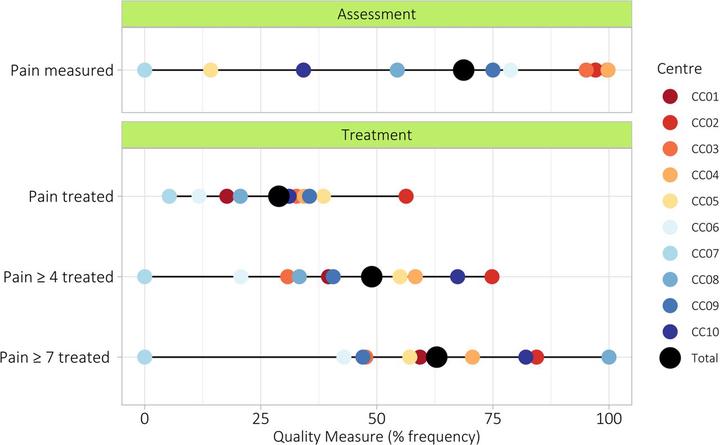Implementation of the WHO standards to assess quality of care for children with acute pain in EDs: findings of a multicentre study (CHOICE) in Italy
 Results on the four prioritised WHO Standard-based Quality Measures for pain in children (2019–2020). Note: facilities were identified in the legend as CC (CC1–CC10); for pain treated, the total records were included.
Results on the four prioritised WHO Standard-based Quality Measures for pain in children (2019–2020). Note: facilities were identified in the legend as CC (CC1–CC10); for pain treated, the total records were included.Abstract
ABSTRACT
Background There is little experience on the use of the WHO Standards for improving the quality of care (QOC) for children. We describe the use of four prioritised WHO Standard-based Quality Measures to assess the provision of care for children with pain in emergency departments (EDs). Methods In a multicentre observational study in 10 EDs with different characteristics in Italy, we collected data on 3355 children accessing the EDs between January 2019 and December 2020. The association between children and facility characteristics and quality measures was analysed through multivariate analyses. Results The proportion of children whose pain was measured was 68.7% (n=2305), with extreme variations across different centres (from 0.0% to 99.8%, p<0.001). The proportion of children treated for pain was 28.9% (n=970) again with a wide range (5.3%–56.3%, p<0.001). The difference between the frequency of children with pain measured and pain treated varied widely between the facilities (ranging from −24.3 to 82). Children with moderate and severe pain were more frequently treated (48.9% and 62.9% of cases, respectively), although with large variations across centres (ranges: 0%–74.8% and 0%–100% respectively, p<0.001). After correction for children’s characteristics, the variable more strongly associated with analysed outcomes was the facility which the child accessed for care. Being a facility in Northern Italy was associated with a higher rate of pain measurement (67.3%–95% CI: 39.9% to 94.6%, p<0.001) compared with facilities in South Italy (−22.1% lower (95% CI: −41.7% to −2.50%, p=0.03). Conclusions The use of few WHO Standard-based measures related to pain can help identifying priority gaps in QOC for children and in monitoring it over time. There is a need for more implementation research to establish which are the most sustainable and effective interventions to improve the QOC for acute pain in children.